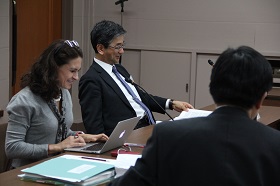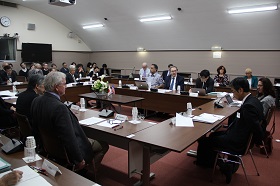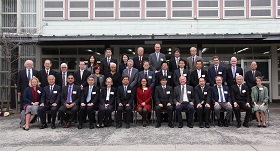- Events
44th meeting of the Scientific Advisory Committee held March 1-3
44th Scientific Advisory Committee Meeting held at Hiroshima RERF Department of Epidemiology’s turn to undergo in-depth review

SAC Co-chairpersons Dr. Francesca Dominici, Harvard School of Public Health (left), and Dr. Tomotaka Sobue, Osaka University

Participants taking in overview of this year’s recommendations announced by Co-chairpersons

Participants of the 44th Scientific Advisory Committee meeting in front of Hiroshima RERF
The 44th meeting of the Scientific Advisory Committee (SAC), an external body made up of experts, was held over three days, March 1-3, 2017, at the Hiroshima Laboratory of the Radiation Effects Research Foundation (RERF). Numerous results have been generated by RERF using long-term follow-up data from A-bomb survivors, and because not all RERF departments can be reviewed at one time, a different department undergoes an in-depth review each year. This year, the SAC conducted an in-depth review of the Department of Epidemiology. For this purpose, in addition to the 10 regular SAC members from the U.S. and Japan, experts in the fields of cancer epidemiology and radiation epidemiology were invited to serve as Special Scientific Advisors. A total of 13 advisors thus participated in this year’s meeting.
Following RERF Chairman Ohtsura Niwa’s greetings, Dr. Robert L. Ullrich, RERF Vice Chairman, presented an overview of RERF’s organizational structure and finances, responses to the previous year’s SAC recommendations, research activity highlights, priority issues, and measures for continuing to revitalize the organization.
In addition to RERF responses to the previous year’s SAC recommendations and its future plans, four research scientists from the Department of Epidemiology, the department receiving the in-depth review this year, made presentations, leading to discussions about effect modification by lifestyle factors on site-specific cancers and other issues.
Besides the presentations made by other research departments, a report was made on the Epidemiological Study of Health Effects in Fukushima Emergency Workers. There were also informal sessions related to the three RERF research clusters (cancer, non-cancer, and genetics) and its Department of Information Technology. Mid- and long-term issues were also discussed, including RERF’s future vision amid declining numbers of A-bomb survivors.
On the final day after completion of the review, the SAC presented an overview of this year’s recommendations.
Dr. Robert L. Ullrich, in an appreciation message to RERF staff after conclusion of the event, conveyed SAC’s impressions: “The SAC committee told me that the organization of the review and the presentations were outstanding,” providing the SAC with a clear and comprehensive overview of the departments and the breadth and depth of RERF’s research programs. He added, “I think their [the SAC’s] report will be very useful for our future directions, and we should all look forward to seeing it.”
Please find the list of participants below.
SCIENTIFIC ADVISORS
- Dr. Francesca Dominici,
- Professor of Biostatistics, Department of Biostatistics; Senior Associate Dean for Research, Office of the Dean, Harvard School of Public Health, Co-chairperson
- Dr. Tomotaka Sobue,
- Professor, Department of Social and Environmental Medicine, Graduate School of Medicine, Osaka University, Co-chairperson
- Dr. Yoichi Gondo,
- Team Leader, Mutagenesis and Genomics Team, RIKEN BioResource Center
- Dr. Michiaki Kai,
- Professor, Environmental Health Science, Department of Health Sciences, Oita University of Nursing and Health Sciences
- Dr. Kazuo Sakai,
- Professor, Faculty of Nursing, Tokyo Healthcare University
- Dr. Shunichi Yamashita,
- Trustee/Vice President, Nagasaki University
- Dr. Michael Cornforth,
- Professor and Director of Biology Division, Department of Radiation Oncology, The University of Texas Medical Branch
- Dr. Anatoly Dritschilo,
- Professor and Chairman, Department of Radiation Medicine, Georgetown University School of Medicine
- Dr. Jonine Bernstein,
- Attending Epidemiologist, Co-Program Leader Survivorship, Outcomes and Risk Program, Memorial Sloan Kettering Cancer Center
- Dr. Nilanjan Chatterjee,
- Bloomberg Distinguished Professor, Department of Biostatistics, Bloomberg School of Public Health and Department of Oncology, School of Medicine, Johns Hopkins University
SPECIAL SCIENTIFIC ADVISORS
- Dr. Kazuo Tajima,
- Visiting Professor, Department of Public and Occupational Medicine, Mie University Graduate School of Medicine
- Dr. Amy Berrington,
- Branch Chief and Senior Investigator, Radiation Epidemiology Branch, National Cancer Institute
- Dr. Sally Amundson,
- Associate Professor of Radiation Oncology, Center for Radiological Research, Columbia University Medical Center
